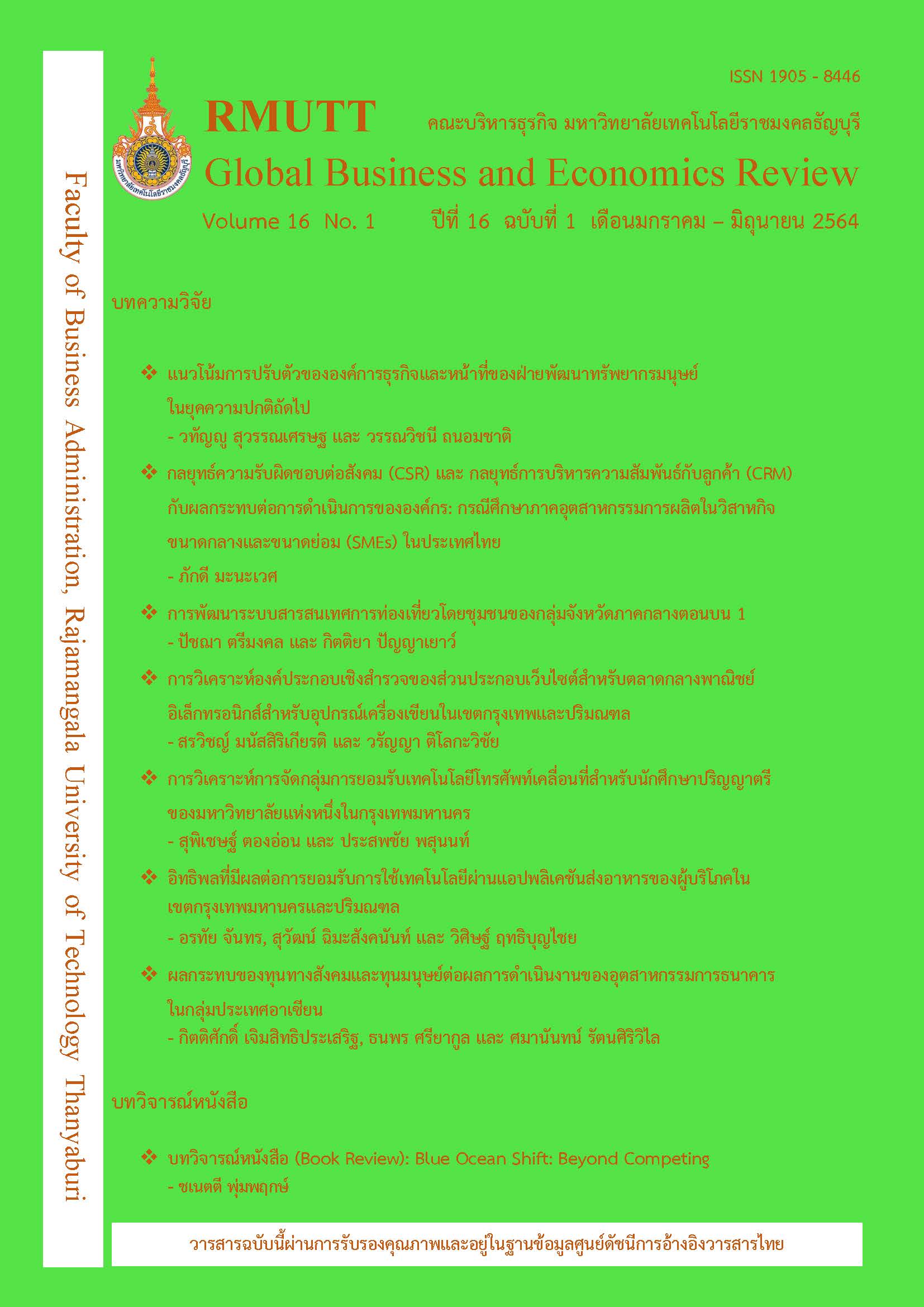CLUSTER ANALYSIS OF TECHNOLOGY ACCEPTANCE MOBLIE PHONE AMONG UNDERGRADUATE STUDENTS IN UNIVERSITY IN BANGKOK
Keywords:
Cluster Analysis, Mobile Phone Technology Acceptance, ApplicationAbstract
The purpose of this research is to cluster the acceptance of mobile phone technology among undergraduate students in a university in Bangkok. This research study is quantitative research. The statistic used is the Cluster Analysis classified by the K-Means method. The samples used in this research are undergraduate students in a university in Bangkok. The sample numbers were carried out by using Taro Yamane's formula. The sampling error was determined at a 95 percent confidence level () which got 393 samples selected using the Accidental Sampling technique. This research consists of 4 variables, which include demographic data, recognition of benefits from mobile phone use, recognition of ease of use in mobile phones, and attitude towards use. The result of the research shows that the acceptance of mobile phone technology among undergraduate students in a university in Bangkok is divided into four groups as follows: The first group, there are 117 students, which is the group that accepts the benefits of mobile phone use aspect, a lot of alternative applications aspect, and at all times developed software aspect. The second group has 16 students, which is the group that does not accept the mobile phone technology they are using. The third group has 135 students. The group has high technology acceptance in all aspects, and the fourth group has 125 students, which is the group that accepts the mobile phone technology they are using at present.
References
กระทรวงดิจิทัลเพื่อเศรษฐกิจและสังคม. (2562). รายงานผลการสำรวจพฤติกรรมผู้ใช้อินเทอร์เน็ตในประเทศไทย ปี 2561. สืบค้นจาก https://www.etda.or.th/publishing-detail/thailand- internet-user-profile-2018.html
เกวรินทร์ ละเอียดดีนันท์. (2559). การยอมรับเทคโนโลยีและพฤติกรรมผู้บริโภคทางออนไลน์ที่มีผลต่อการตัดสินใจซื้อหนังสืออิเล็กทรอนิกส์ของผู้บริโภคในเขตกรุงเทพมหานคร. (การค้นคว้าอิสระ
ปริญญามหาบัณฑิต, มหาวิทยาลัยกรุงเทพ).
ณัฏฐนันท์ พิธิวัตโชติกุล. (2558). การยอมรับเทคโนโลยีโทรศัพท์มือถือ การตลาดผ่านสื่อสังคมออนไลน์และพฤติกรรมผู้บริโภคออนไลน์ที่ส่งผลต่อความตั้งใจซื้อสินค้าออนไลน์ผ่านแอปพลิเคชันของผู้บริโภคในกรุงเทพมหานคร. (การค้นคว้าอิสระปริญญามหาบัณฑิต, มหาวิทยาลัยกรุงเทพ).
ณัฐชยา รักประกอบกิจ และ นิตนา ฐานิตธนกร. (2559). องค์ประกอบของเว็บไซต์พาณิชย์อิเล็กทรอนิกส์และความไว้ใจในการซื้อสินค้าที่มีผลต่อการตัดสินใจซื้อสินค้าแบรนด์เนมผ่านเว็บไซต์พาณิชย์อิเล็กทรอนิกส์ของผู้บรโภคในเขตกรุงเทพมหานคร. ใน การประชุม วิชาการระดับชาติสหวิทยาการเอเชียอาคเนย์ 2559 ครั้งที่ 3. นนทบุรี: โรงแรมริชมอนด์ สไตลิส คอนเวนชั่น.
บุหงา ชัยสุวรรณ. (2561). การจัดกลุ่มและหาคุณลักษณะของกลุ่มดิจิตัลอัมมิแกรท์ตามพฤติกรรมการสื่อสารในบริบทออกไลน์และปัญหาทางความสัมพันธ์กับสังคม. วารสารพัฒนบริหารศาสตร์, 58(1), 54-73.
มณียา สุรธรรมจรรยา. (2558). ผลการใช้แอปพลิเคชันสำหรับสอนคำศัพท์ภาษาอังกฤษบนแท็บเล็ตวิชาภาษาอังกฤษสำหรับนักเรียนชั้นประถมศึกษาปีที่ 2 สังกัดสำนักงานเขตพื้นที่การศึกษา ประถมศึกษาราชบุรี เขต 2. (วิทยานิพนธ์ปริญญามหาบัณฑิต, มหาวิทยาลัยศิลปากร).
รวิวรรณ คงแก้ว. (2559). ปัจจัยที่ส่งผลต่อทัศนคติในการตัดสินใจใช้คลาวด์คอมพิวติ้งในองค์กร. กรุงเทพฯ: มหาวิทยาลัยนานาชาติแสตมฟอร์ด.
ศศิจันทร์ ปัญจทวี. (2560). ปัจจัยที่ส่งผลต่อการยอมรับการใช้ระบบสารสนเทศ กรณีศึกษา สถาบันการพลศึกษาวิทยาเขตเชียงใหม่. (การค้นคว้าอิสระปริญญามหาบัณฑิต, มหิทยาลัยราชภัฏเชียงใหม่).
ศิริวรรณ เสรีรัตน์. (2538). ทฤษฎีด้านประชากรศาสตร์. กรุงเทพฯ: พัฒนาการศึกษา.
สมญัติ คำปาละ. (2537). การยอมรับการใช้ไมโครคอมพิวเตอร์ในงานสอบสวนของพนักงานสอบสวน: กรณีศึกษาพนักงานสอบสวนระดับสารวัตร สังกัดกองบัญชาการตำรวจนครบาล. (วิทยานิพนธ์ ปริญญามหาบัณฑิต, สถาบันบัณฑิตพัฒนาบริหารศาตร์).
สำราญ มีแจ้ง. (2557). สถิติขั้นสูงสำหรับการวิจัย ทฤษฎีและปฏิบัติ. กรุงเทพฯ: จุฬาลงกรณ์มหาวิทยาลัย.
อรลดา แซ่โค้ว. (2558). เว็บแอปพลิเคชันการจัดการความรู้ผ่านโทรศัพท์เคลื่อนที่สำหรับนักศึกษาระดับปริญญาตรี. (วิทยานิพนธ์ปริญญามหาบัณฑิต, มหาวิทยาลัยเทคโนโลยีราชมงคลธัญบุรี).
อัครเดช ปิ่นสุข. (2558). การยอมรับเทคโนโลยีสารสนเทศ คุณภาพการบริการอิเล็กทรอนิกส์ และส่วนประสมการตลาดในมุมมองของลูกค้าที่ส่งผลต่อความพึงพอใจ (E-satisfaction) ในการจองตั๋วภาพยนตร์ออนไลน์ผ่านระบบแอปพลิเคชันของผู้ใช้บริการในจังหวัดกรุงเทพมหานคร. (การค้นคว้าอิสระปริญญามหาบัณฑิต, มหาวิทยาลัยกรุงเทพ).
TNNThailand. (2562). ยืนหนึ่ง คนไทยใช้เวลาอยู่กับเน็ตสูงเป็นอันดับ 1 ของโลก. สืบค้นจาก https://today.line.me/th/pc/article
Bucher, E., Fieseler, C., Meckel, M., & Suphan, A. (2011). Social Media and the Communication Profession. Retrieved from https://www.alexandria.unisg.ch/publications/citation/Anne Suphan/91164
Davis, F. (1985). A technology acceptance model for empirically testing new end-user information systems: theory and results, Unpublished Ph.D. dissertation. MIT Sloan School of Management, Cambridge.
Lee, F. H., & Wu, W. Y. (2011). Moderating effects of technology acceptance perspectives on e-service quality formation: Evidence from airline websites in Taiwan. Retrieved from http://www.elservier.com/locate/eswa.
Knobloch-Westerwick, S. (2007). Gender differences in selective media use for Mood Management and mood adjustment. Journal of Broadcasting & Electronic Media, 51(1), 73–92.
Stols, G. (2008). African Journal of Research in Mathematics, Science and Technology Education. Retrieved from https://scholar.google.com/ citations?view_op=view_ citation&hl=hr&user=MMubJYoAAAAJ&citation_for_view=MMubJYoAAAAJ:Y0pCki6q_DkC
Yamane, T. (1967). Statistics: An introductory analysis. New York: Harper and Row.
Downloads
Published
How to Cite
Issue
Section
License
The articles published in this journal are the intellectual property of their respective authors.
The views and opinions expressed in each article are solely those of the individual authors and do not reflect the positions of Rajamangala University of Technology Thanyaburi or any of its faculty members. All components and content of each article are the sole responsibility of the respective authors. In the event of any errors, the authors shall bear full responsibility for their own work.








